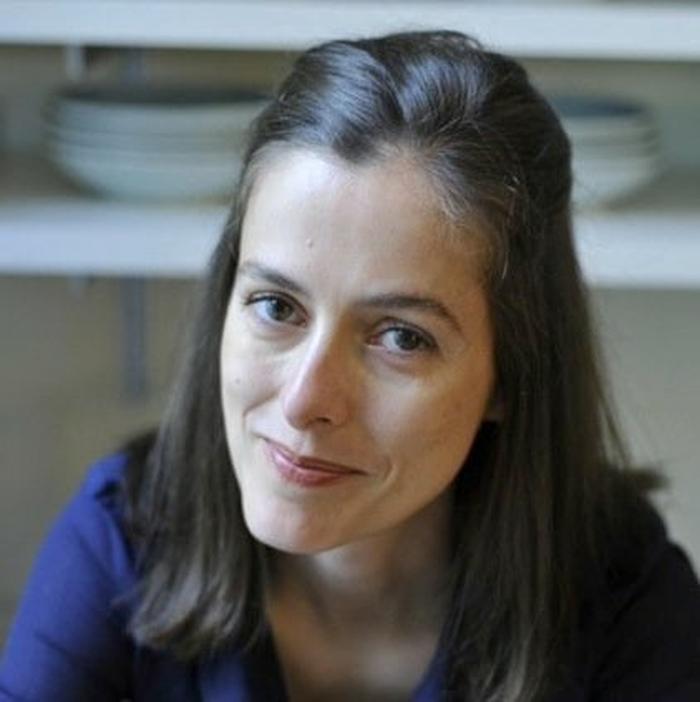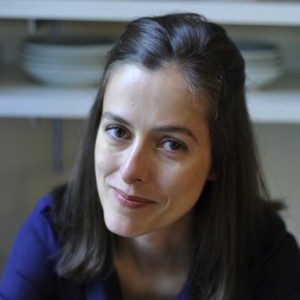
This article is the next installment in our “Finding Your Path” series. Over the next few months, our friends at 40:20 Vision will feature successful 40-something women sharing their stories on how they found their career path, and the lessons they’ve learned along the way.
Amanda Hesser, Co-founder, Food52
 What did you want to be when you were a kid? I just wanted to escape my small town, travel, and eat well!
What did you want to be when you were a kid? I just wanted to escape my small town, travel, and eat well!
Education: Bentley University, BS Economics and Finance; Ecole de Cuisine Lavarenne, Cooking, Les Dames d’Escoffier scholarship recipient.
First job: A restaurant in Cambridge, Mass.
One staple every 20-something should have in their kitchen: A good olive oil.
Best sales pitch? Bake them a chocolate cake. The sugar high will make them say yes!
Background: What struck me as I heard Amanda’s story is that her entrepreneurial start was not actually with Food52, the collaborative cooking community that she started with Merrill Stubbs in 2009, but rather with her culinary education. Scrappy from the start, she decided she wanted to apply for a culinary scholarship from Les Dames d’Escoffier, a professional society for women in food. Except that she didn’t want to take the existing scholarship, which was only offered for American cooking schools—she wanted to train in Europe.
So she did what any entrepreneur seeking angel investment would do. She pitched her idea. She cobbled together a business plan that included where she would study, how much it would cost, and how it could benefit the scholarship organization. (She also made a chocolate cake for the presentation.)
And she got the scholarship. According to Amanda, “I think they were on such a sugar high that they decided that it was a good idea to give me a bunch of cash and let me run off to Europe.”
But I think it was 100% Amanda. Behind the mischievous sparkle in her eyes, there’s a fierce determination and mind for business. From writing her first book at 23 to becoming the youngest food reporter at the New York Times to building a Twitter app back in 2007, she has a vision for what is next and the ability to make it happen.
That’s exactly what she did with Food52, the first crowd-sourced curated cookbook. It grew from a 52-week recipe experiment to a thriving community of talented, well-informed food people who loved to contribute.
Read on to find out how this foodie found her path—and the advice she’d give to any ambitious 20-something.
When you majored in Economics and Finance, did you see that parlaying into food and travel?
No. I figured I would get some international corporate job that would allow me to live life well. I was misguided.
When did you realize that was not your path?
In college. I was bored and unhappy with my studies. Then I did some study abroad and I saw all these wonderful foods that were completely new to me. It was a source of inspiration. I thought that there must be something to do with my life that would feel more genuine and inspired.
So I stopped what I was doing in college and said, “I'm going to go to Europe to and figure out a way to make this work.” I researched and networked. On spring break, I took trains all around Europe to introduce myself to the owners at places where I wanted to work. Then I pitched the scholarship to Les Dames d’Escoffier and got to cook in Germany, France, Switzerland, and Italy. By the time I finished, I had found my place.
When you finished the scholarship, you went on to write a book at age 23. How did that change your life?
That was a turning point. I had the youthful hubris to think that I could write a book when I'd never written anything before. It established me as a writer, and that led to the New York Times hiring me as a food reporter. The job was partly good timing, but also, at 24 years old, I had proven that I was scrappy and resourceful. At the very least, they knew I was going to work my butt off for not very much money. It was a win-win.
What motivated you to leave the Times after 11 years?
I felt I had done everything I could do there in food. After being a food reporter for a while, I went to the editor of the magazine and convinced him that they needed a food editor and that I could do the job. Again, I made a proposal for what I could do if he created this job for me. He went for it. Then I launched a magazine for them called T Living. I also wrote a bunch of books.
On the side, I was working on an idea for a startup that had nothing to do with food. When the Times started offering buyouts, I took one. That gave me the cash to live on while I went down this new road.
How did you come up with the idea for Food52?
After a year, I decided not to pursue my first startup idea—but I had the entrepreneurial bug. My friend Merrill was helping me finish the New York Times Cookbook and we started talking about what was missing online. Neither of us had a food site that we liked going to. There had to be a reason for that because we both love food. Essentially it was getting to the bottom of “Why is that?” and “How can we fix that?”
What was your aha moment of knowing “this is what we’re going to do”?
One day when we were talking, we wondered, “what if anyone on the Internet could participate in the creation of a cookbook?” That became the idea for Food52. We created the first crowd-sourced curated cookbook in 52 weeks. The cookbook was a calculated proof of concept: At the end of the 52 weeks, we knew we could have a great cookbook. If turned out we could build a business around it, even better. We bootstrapped the idea with a book deal.
When did you know it was more than a book deal?
A lot of people showed up and they loved the community. We realized that community is what was really lacking online. There was no place for people who love food to come together and share ideas and get credit for their knowledge. At Food52, people contribute the recipes. They vote. They test recipes.
What did you learn on your path that you’d share with women in their 20s?
I took a class taught by Barbara Wheaton, one of the most well-respected food historians in the country. I asked her whether I should go to Europe and cook. She said, “You don't have to ask. Why are you asking for permission? You don't need to ask for permission. You just do what you want.
It has always stuck with me. It’s good career advice. You can get caught up in this bubble of people approving and disapproving of what you're doing. What matters is whether you want to do it. Nobody is hanging around waiting to stop you—so why wait for somebody to give you permission?
Want more? Follow Amanda on Twitter at @amandahesser or get real-time answers to your cooking questions on the new Food52 Hotline.